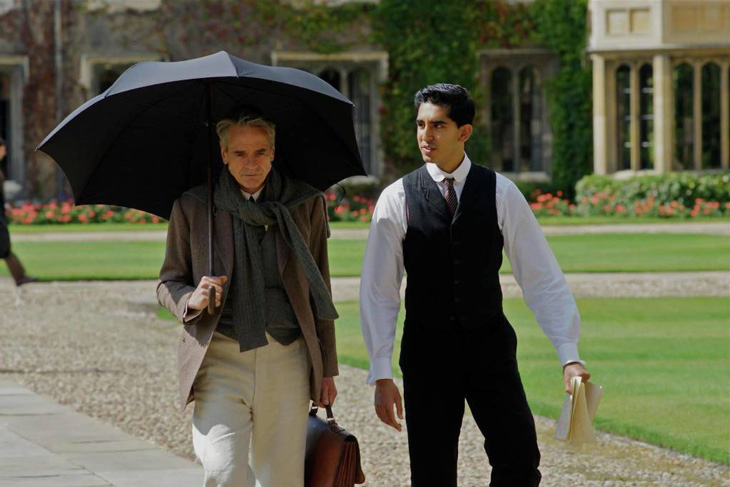The Man Who Knew Infinity review: a moving tribute to one of the gods of mathematics

Director Mathew Brown's stab at a biopic about the unlikely and extraordinary academic relationship between Srinivasa Ramanujan (Dev Patel), and GH Hardy (Jeremy Irons), one of England's most eminent mathematicians, is a moving film despite managing to over simplify the subject matter.
But hey, that's what sells.
The movie is similar to two recent biopics, The Theory of Everything (Stephen Hawking) and The Imitation Game (Alan Turing) - all part of the "misunderstood genius" genre in the way they attempt to show us an unknowable mind traversing the realm of abstract thought while humanising their subjects.
As mathematicians go, Ramanujan was a prophet of sorts. His genius - his ability to divine formulas seemingly from thin air - still has a huge impact in the field: more than a century later, his formulae are still informing computer development, economics and the study of black holes.
But for a movie about numbers, it fails to really engage the brain and instead focuses on tugging at our heart strings.
Polite and well-intentioned
A shipping clerk, Ramanujan's remarkable path to Cambridge University distinction began in provincial Madras in 1914. We first meet him in a temple where he scribbles with chalk on the floor like a man possessed.
Looking to find a place where he can pursue his passion, Ramanujan writes to the great Cambridge mathematician Hardy, who at first thinks the letter is a prank by his friend and colleague John E Littlewood (wonderfully played by Toby Jones).
At first they have no clue what to make of him - an uneducated man from India who seems to have answers to some of mathematics unsolvable mysteries.
But after Hardy realises that the young man's brilliance is on par with that of renowned mathematicians Leonhard Euler and Carl Jacobi, he invites Ramanujan to Cambridge in the hope of seeing proof of his assertions.
Ramanujan eventually stayed for five years - enduring the hardships resulting from World War I, as well as bigotry and a bout of tuberculosis - and in 1918 became the second Indian to be elected a Fellow of the Royal Society and the first Indian Fellow at Trinity.
A dynamic relationship

Much of the film is a typical culture-clash story, but it's not just one of East versus West. Rather, it's a clash between instinct and process.
Ramanujan does all his equations in his head and is often unable or unwilling to show his work and include proofs with his formulas.
For a man of process and detail like Hardy, this is almost unthinkable. "Intuition is not enough," he tells Ramanujan. "It has to be held accountable." But for Ramanujan, math is a matter of divine inspiration - an idea Hardy can't quite grasp. "I'm what you'd call an atheist," he tells Ramanujan, who replies, "No, sir, you believe in God - you just don't think he likes you."
It's all very polite, well-intentioned and there are many scenes that come across as very sincere. To its credit, there are no manic scenes at blackboards or scribbling on windows and wall that we've become all too familiar with. But you'll see a lot of shots of people running down courtyards triumphantly holding up handfuls of paper.
Jeremy Irons also manages to steal the show from Dev Patel as the socially inept Hardy and you can tell that he clearly enjoyed playing an experienced mathematician. Patel is earnest and desperate as usual - it's a throwback to his Slumdog Millionaire days.
What the movie gets very wrong is its portrayal of a staunch Brahmin as far more anglicised than he ever was. His pious distress at the dining hall menu is a sympathetic insight, but it wasn't enough. Ramanujan's relationship with his wife Janaki (Devika Bhise) is also given far too much time and her relationship with his mother plays out like a soap opera.
The verdict
The Man Who Knew Infinity plays it very safe by reducing Ramanujan's life into a well-established sellable movie formula.
But it's a wonderful change from the fare we've getting recently.







![BJP's Kapil Mishra recreates Shankar Mahadevan’s ‘Breathless’ song to highlight Delhi pollution [WATCH] BJP's Kapil Mishra recreates Shankar Mahadevan’s ‘Breathless’ song to highlight Delhi pollution [WATCH]](https://images.catchnews.com/upload/2022/11/03/kapil-mishra_240884_300x172.png)

![Anupam Kher shares pictures of his toned body on 67th birthday [MUST SEE] Anupam Kher shares pictures of his toned body on 67th birthday [MUST SEE]](https://images.catchnews.com/upload/2022/03/07/Anupam_kher_231145_300x172.jpg)






